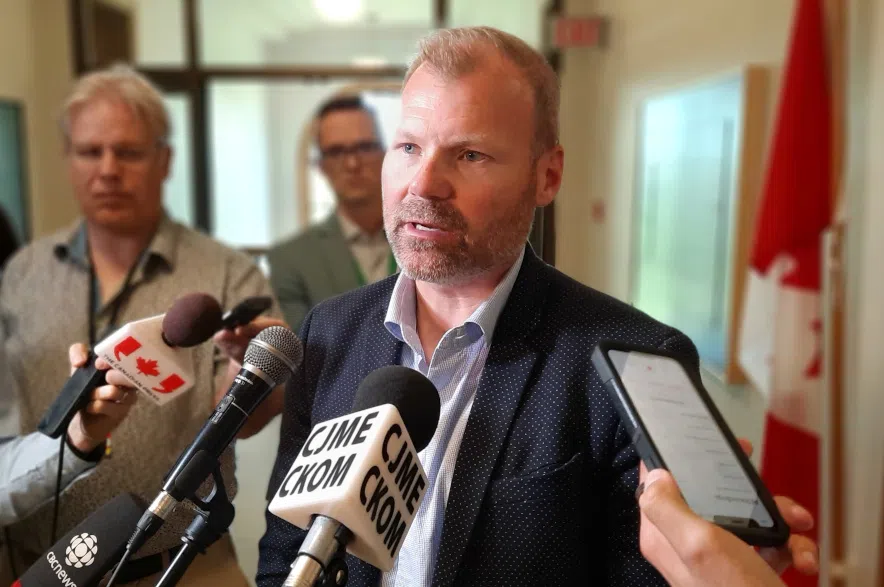The federal government’s proposed Clean Electricity Regulations are getting a big stamp of disapproval from the Government of Saskatchewan.
According to the province, the proposed regulations “impose a net-zero electricity grid across Canada by 2035.”
A statement from the federal government said the proposed regulations “would set performance standards that would ensure that the sector achieves significant transformation by 2035, so that a robust foundation of clean electricity is available to power the electric technologies (e.g. electric transportation) needed to support Canada’s transition to a net-zero GHG emissions economy by 2050.”
Urging Ottawa not to proceed with the regulations, Dustin Duncan — the minister responsible for SaskPower — called the proposed rules “unaffordable, unconstitutional, and technologically and logistically unattainable.”
Duncan said he believes Saskatchewan can achieve its net-zero goal with “a lot of work,” but not on Ottawa’s timetable.
“We think that we can get there by 2050. It’s just that 2035 is just impossible,” said Duncan.
Duncan argued that the federal government should not be encroaching into the province’s jurisdiction over power generation, but also noted that meeting Ottawa’s target would mean a huge increase in power bills.
According to the province, SaskPower has estimated that electricity rates would need to “more than double by 2035” to make up the costs associated with the clean electricity regulations and federal rules around coal use. All told, Ottawa’s net-zero power plan is expected to cost the province around $40 billion between now and 2035.
READ MORE:
- SaskPower pushes forward with nuclear energy developments
- Moe tells Gormley withholding carbon tax payments ‘likely not’ legal
- Legislation introduced to cut carbon tax from SaskEnergy bills
To comply with the proposed rules, the province said SaskPower would have to “expand, replace and rebuild more than 100 per cent of its current power generating capacity” in just 11 years, while also making significant investments into its transmission network.
“The proposed Clean Electricity Regulations will jeopardize the reliability of Saskatchewan’s power grid, and increase power rates to an unaffordable level,” Duncan said in a statement Tuesday.
The provincial government noted it has already “invested billions of dollars in its transition to a net-zero future,” but doesn’t have a non-emitting source of baseload power available in the short term.
In the longer term, the government noted that Saskatchewan is making investments into the development of clean technologies including small modular reactors, carbon capture on natural gas and long-duration “utility-scale energy storage” as part of the provincial plan to reach net-zero emissions by 2050.
“While technical solutions are gradually developing, we must plan now to power the next decade of growth with the foundation of reliable baseload electricity,” Duncan added.
“Our government will not risk the affordability and reliability of Saskatchewan’s power grid to attempt the impossible based on an arbitrary federal emissions target and timeline. We call on the federal government to acknowledge and accept Saskatchewan’s plan to build and protect our economy while ensuring the continued viability of our power system and publicly-owned Crown utility for generations to come.”
Duncan said it isn’t a question of whether or not emissions should be reduced.
“It’s just a question of this not being realistic and practical for Saskatchewan. It’s not that we don’t want to get to a net-zero state; it’s just that we can’t do it by 2035,” he said.
The minister said other provinces, which are further along in their net-zero journeys, are saying the same things and are looking to have the federal government redraft the regulations.
Duncan said he hopes the dispute won’t escalate to the point where the province disobeys federal regulations, but said it would be an option on the table.
“If it’s a question of following the (Clean Electricity Regulations) or making sure that people have lights and heat in the winter of 2035, yeah, we’ll make that decision for sure.”
The provincial government outlined its concerns over the regulations in a letter to Steven Guilbeault, Canada’s environment minister, dated Nov. 2. The full letter can be read below.
Saskatchewan NDP agrees, somewhat
The Saskatchewan NDP agrees with the provincial government in principle on this one — getting to a net-zero electricity grid by 2035 isn’t feasible for Saskatchewan.
“What I’m hopeful for and what my expectation is — and I think the expectation of people in the province — is that there are some actual solutions put forward, actual alternatives and an actual plan,” said NDP SaskPower Critic Aleana Young.
Duncan and SaskPower’s president have been clear they believe the Crown corporation has been moving significantly in adding to its grid and building infrastructure for renewable energy, but Young would disagree. She said the province used to be a leader in such things, but is now lagging behind.
“Could 2035 have been achievable with a different government actually interested in investing in SaskPower over the past 16-odd years? Yes. Is it achievable today? No,” Young said.
The reality now is that the Sask. NDP is on the side opposite the federal government in this situation.
“I think we’ve been quite clear that the feds need to give their head a shake,” said Young.
But she also said Saskatchewan’s government needs to be interested in solutions and not just looking for another fight with the Trudeau government.
She said the federal government needs to come to Saskatchewan with real dollars for the electricity grid, like it has in Manitoba, Newfoundland and Ontario.
— With files from 980 CJME’s Lisa Schick











